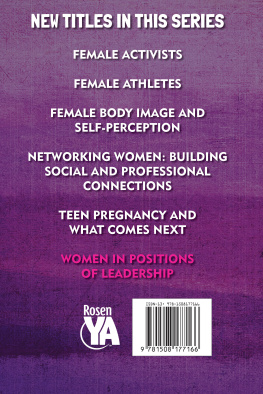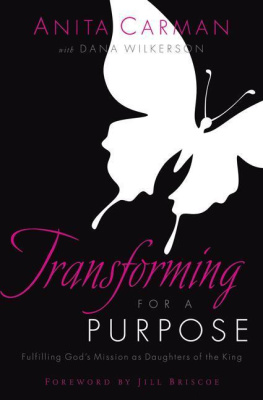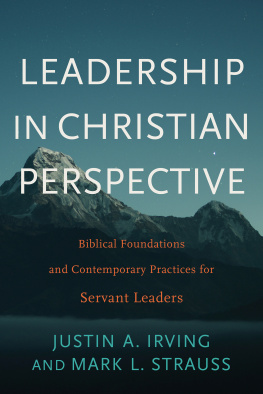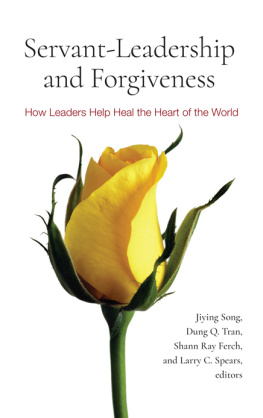Published by
State University of New York Press, Albany
2010 State University of New York
All rights reserved
Printed in the United States of America
No part of this book may be used or reproduced in any manner whatsoever without written permission. No part of this book may be stored in a retrieval system or transmitted in any form or by any means including electronic, electrostatic, magnetic tape, mechanical, photocopying, recording, or otherwise without the prior permission in writing of the publisher.
For information, contact State University of New York Press, Albany, NY
www.sunypress.edu
Production by Eileen Meehan
Marketing by Michael Campochiaro
Library of Congress Cataloging-in-Publication Data
Ngunjiri, Faith Wambura, 1973-
Women's spiritual leadership in Africa : tempered radicals and critical servant leaders / Faith Wambura Ngunjiri.
p. cm.
Includes bibliographical references and index.
ISBN 978-1-4384-2977-9 (hbk. : alk. paper)
1. Leadership in womenAfrica. 2. Women leadersAfrica. I. Title.
HQ1787.N495 2010
| 305.420967dc22 | 2009018959 |
| 10 9 8 7 6 5 4 3 2 1 |
Foreword
By Judy A. Alston
I was honored when Faith asked that I write the foreword for this book. To be able to see the fruits of my teaching and mentoring labor bear her own fruit is an awesome experience that makes the past 21 years that I have spent as an educator so much more worthwhile.
The Road to Leadership
When I consider the concept and reality of leadership, from my own worldview, I must first situate myselfbeginning with who I am, what I bring, and how I have come to know. In many respects, I respond to inquiry on every side of this notion of leadership with more questions than answers. So I begin this foreword with some fundamental knowledge that will assist the reader with an increased understanding of my perspective as it relates to a (re)visioning of leadership from one Black woman's perspectivea womanist () perspective.
As I have noted in other writings, there is a dearth of research and writing on women of color and leadership, more specifically from my view as a Black (African American) woman. The desire and passion for this area of research came to fruition during my doctoral studies, but perhaps it was always there in my life experiences as both a tempered radical and servant leader from the beginning.
In August 1996 I received my Ph.D. in educational administration from Pennsylvania State University. Prior to reaching this goal, I had been trained in some of the finest educational institutions in South Carolina. I received a BA in English from Winthrop College, an M.Ed. in secondary English and an M.Ed. in educational administration, both from the University of South Carolina. My K-12 parochial education in Charleston, South Carolina, began with a focus on the basics (reading, writing, arithmetic, and religion), with a continued focus on college preparatory curricula and extracurricula leadership opportunities. Since 1987, as a teacher, teacher-leader, and now university professor/ administrator, I have committed my life, personally and professionally, to improving educational and organizational leadershipwhat I believe to be my mission in life.
In addition to my education profile, I am Black. I am a woman. I am middle class. I am a Christian. I am an American citizen. I have a sexual orientation. I have an astigmatism. These axes of identity, public and private, create the intersections of my selfhood and my view of leadership.
As I matriculated from my K-12 education to the completion of a terminal degree, I was most often in classrooms (usually the only person of color, or one of few, except in K-8) and under the administrative leadership of white, Eurocentric teachers, professors, and administrators. In only a few cases (six to be exact) did I have a classroom teacher or professor who was a person of colorfive Black, one Cuban. This educational context and experience, coupled with my training, has led me to a particular meaning making that guides me to think, interrogate, analyze, critique, and (re)act. The epistemological underpinnings, the ways in which I have come to know and influence what is known, have become a critical unit of analysis as I explore the social and political transformation of educational/organizational leadership. It is within this positionality (, p. 474) that the theoretical frame for my discussion, teaching, and research of leadership finds it genesis.
Black and African Women in Leadership
The focus concepts of this bookservant leadership, tempered radicalism, spirituality, and meaning makingwere all formally introduced and delineated in courses that I taught while I was a professor at Bowling Green State University in the leadership studies doctoral program. This text meshes these concepts along with the experiences and knowledge of the marginalized to the center by standing aside to let the community speak for itself (), Dr. Ngunjiri extends this research by focusing on African women leaders who are spirited, tempered radicals (a combination of Africana spirituality, tempered radicalism, and servant leadership).
In the context of preparation, practice, and research, a few cornerstones of leadership (power, control, authority, and influence) have historically been used in a negative fashion to marginalize, silence, and erase the accomplishments of historically underrepresented groups, that is, women, African Americans, Latinos, and Native Americans, as well as gays and lesbians. noted that the tradition of African American women's leadership is absent from the literature in general. Often in the field of leadership preparation and leadership studies, the voices of the marginalized are not heard in the discussion or teaching of leadership theories, concepts, and research in general, thus it is a slanted view of the concept. Therefore, in order bring some balance to the field, the perspectives, experiences, and voices of Black and African women leaders are essential to the study of leadership.
I heard once that history is about winners and losers, and the winners get to tell their story. In many ways, the winners have told their story about leadership, and their concepts, models, and examples of leadership have reigned supreme and superior. Furthermore, the silencing of some groups while privileging others in the study of organizational leadership has been a product of theoretical perspectives that frame our current understanding of gender, discourse, and organization ().
Dr. Ngunjiri's new work brings to the fore a new landscape, a much-needed addition to the discourse. It is transformative and powerful research that will broaden and enrich those people who take the opportunity to read and extend their own knowledge and experiential bases.
Judy A. Alston, Ph.D., is director/associate professor of the doctoral program in educational leadership at Ashland University, Ashland, Ohio. Her research foci include Black female school superintendents; the exploration of how the intersections of class, race, ethnicity, gender, sexual diversity, and ability affect educational leaders; tempered radicals; servant leadership; and Black gay, lesbian, bisexual, and transgender (GLBT) issues in educational leadership. She is the coauthor of










